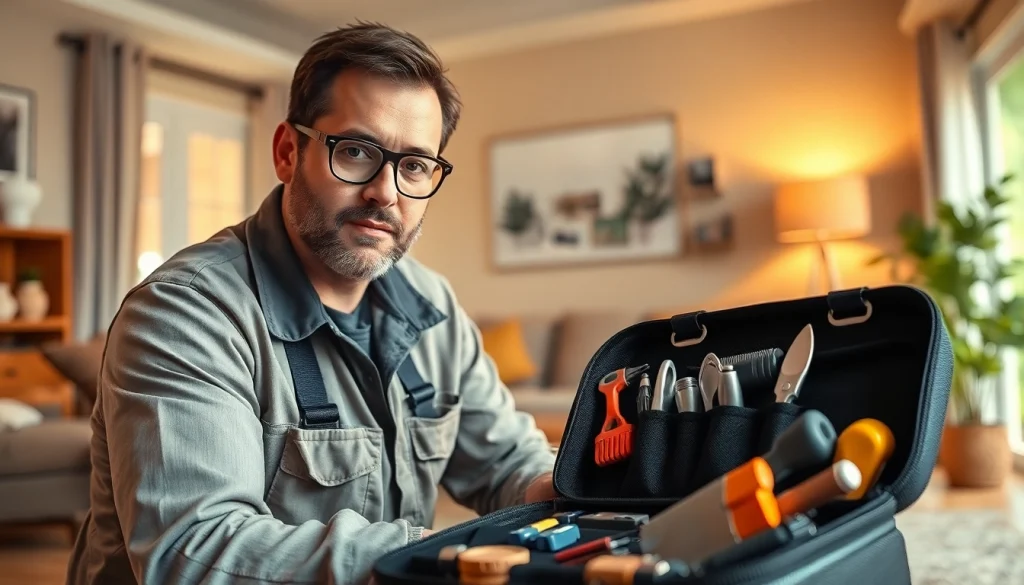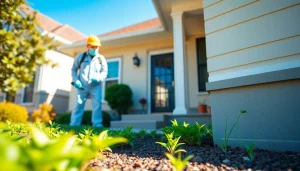Comprehensive Pest Control Services: Safeguarding Your Home from Unwanted Threats

Understanding Pest Control Services
What Are Pest Control Services?
Pest control services refer to the systemic methods used to identify, manage, and eliminate unwanted insects and wildlife from residential and commercial properties. These services encompass a wide range of techniques, from chemical treatments to more environmentally friendly solutions such as traps and natural repellents. A key component of pest control is the initial assessment, which helps determine the extent of the infestation and the most appropriate methods for eradication and prevention. Engaging in pest control services is essential for maintaining a healthy living environment.
Common Types of Pests Managed
Pest control services address a diverse array of pests that can invade homes and businesses. The most commonly managed pests include:
- Insects: This category includes ants, cockroaches, termites, bed bugs, and fleas. Each of these pests can cause significant damage or pose health risks.
- Rodents: Mice and rats are prevalent nuisances that can carry diseases, contaminate food, and cause structural damage.
- Wildlife: Animals such as raccoons, squirrels, and skunks may invade properties, causing harm to gardens, attic spaces, and trash bins.
Importance of Professional Pest Control
While several DIY pest control methods exist, professional services offer more comprehensive solutions based on expert knowledge and experience. Professionals are equipped with the right tools and products to effectively handle pest issues, ensuring that problems are resolved swiftly and sustainably. Moreover, they provide insights into preventive measures that can deter further pest intrusion, ultimately protecting property and health.
How Pest Control Services Work
Inspection and Assessment Processes
The first step in any pest control service is a thorough inspection and assessment of the property. This process involves checking both the interior and exterior for signs of pest activity, including droppings, nests, and damage to structures. Experts also examine potential entry points and conducive conditions, such as moisture levels and clutter that may encourage pest infestations.
Treatment Methods and Techniques
Once an assessment is completed, pest control experts determine the most effective treatment methods. These may include:
- Chemical Treatments: Pesticides are utilized in various formulations to target specific pests. Professionals apply these chemicals in a way that minimizes risk to humans and pets while ensuring effective pest elimination.
- Physical Controls: Traps and barriers are common physical controls. For example, rodent traps can prevent further infestations, while sealing cracks and leaks can deter entry.
- Biological Control: This involves using natural predators or parasites to control pest populations, particularly for insects.
Prevention Strategies for Sustainable Results
After treatment, pest control services often include recommendations for ongoing prevention. This can involve regular inspections, maintenance of clean environments, and education on identifying signs of pests early. By adopting these preventive measures, property owners can significantly reduce the likelihood of future infestations.
Choosing the Right Pest Control Service
Evaluating Service Providers
When selecting a pest control service, it’s important to evaluate several factors to ensure effective and reliable service. Look for providers who are fully licensed and insured, as this indicates adherence to safety and regulatory standards. Additionally, check online reviews and ratings to gauge customer satisfaction and the effectiveness of their pest management strategies.
Questions to Ask Before Hiring
Before hiring a pest control service, consider asking the following questions:
- What types of pest control methods do you use?
- Are your treatments environmentally friendly?
- How do you handle follow-up services and warranties?
- Can you provide references from past clients?
Comparing Costs and Services Offered
Understanding the cost structure of pest control services is crucial. Prices can vary based on the type of pest, the extent of the infestation, and the chosen treatment methods. Obtain quotes from multiple pest control providers and compare their services, ensuring you’re aware of what is included in the price. Remember, the cheapest option may not always be the best in terms of quality and effectiveness.
The Benefits of Regular Pest Control Services
Health and Safety Implications
Regular pest control services are essential for safeguarding health. Many pests, like rodents and certain insects, can carry diseases that pose risks to humans and pets. Additionally, decaying pest bodies can lead to health issues due to bacteria and allergens. A proactive pest control strategy mitigates these health risks, creating a safer living environment.
Long-Term Financial Savings
Investing in regular pest control can lead to significant long-term savings. Preventive measures help avoid costly damage that pests can inflict, such as structural harm from termites or mold growth due to rodent infestations. By addressing pest issues proactively, homeowners can preserve property value and avoid emergency treatment costs.
Environmental Considerations
Professional pest control services are increasingly adopting eco-friendly practices that minimize environmental impact. By utilizing integrated pest management (IPM) techniques, experts focus on the most effective, sustainable solutions for pest control, reducing the need for harmful chemicals and promoting ecological balance.
Frequently Asked Questions About Pest Control Services
How Often Should You Schedule Services?
The frequency of pest control services depends on various factors, including the type of pest, the level of infestation, and specific geographic region characteristics. Generally, quarterly treatments are recommended for ongoing peace of mind, especially in areas prone to pests.
Are Pest Control Treatments Safe for Children and Pets?
Most professional pest control services use products that are safe for children and pets when applied correctly. Technicians will provide guidance on how long to stay away from treated areas, ensuring that safety precautions are maintained.
What to Expect After a Pest Control Visit?
After a pest control visit, you can expect a thorough report detailing the findings of the inspection, the treatment applied, and recommendations for maintaining a pest-free environment. Additionally, follow-up visits may be scheduled to monitor and address any remaining issues over time.






